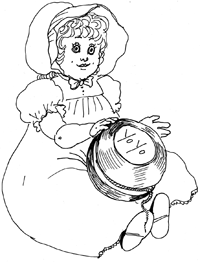STRANGEBUTTRUE- Yo-yo, ma! There've been some big toys

DRAWING BY DEBORAH DERR McCLINTOCK
Q. Toys are thousands of years old, with dolls probably being the world's oldest. What's next in line? –M.A. Tell
A. The "yo-yo." Some say the word is an ancient Tagalog (language of the Philippines) expression for "come- come."
The modern yo-yo has been called a physics lab that can fit into a pocket, with its basic up-and-down motion trading off potential energy into kinetic energy (movement and rotation) and then back up into potential energy again, says David Halliday in Fundamentals of Physics.
Nowadays, the string is not tied to the axle but is looped around it, so when the yo-yo hits bottom, the upward string force stops the descent. The yo-yo then spins, axle inside loop, and keeps on "sleeping" (spinning) until a jerk to the string wakes it up. Better yo-yos with aerospace-rated bearings tend to sleep longer, especially if thrown downward with good initial velocity.
One of the most striking was the yo-yo constructed at MIT in 1977, using two 66-centimeter (26-in.) bicycle wheels linked to a steel shaft and using a nylon cord 81 meters (266 ft.) long. It was released over the side of a 21-story building.
Even more impressive was the 1979 116-kilogram (255 lb.) version at 1.3 meters (51 in.) tall and about 0.80 meters (32 in.) wide, yo-yo'ed from a crane about 30 meters (100 ft.) to set the record for the heaviest yo-yo.
Q. Of all the hungry creatures of the high seas, which ones just might have the best table manners? –F. Willy
A. Those caring, sharing "false killer whales," as they've been dubbed– they're actually dolphins– whose table manners put ours to shame, says Jocelyn Kaiser in Science magazine. Once they've caught a fish, each whale takes a bite, then politely passes it on to another. And if there's a human nearby, he or she will be offered some, too.
Dan McSweeney of the Wild Whale Research Foundation in Hawaii once had a large tuna "handed" to him by a 5-meter-long false killer whale.
"I pushed it back," said McSweeney. "He took it and started chewing on it and then left. It was one of those magical moments."
Their compulsive food sharing is a trait that has endeared Hawaii's false killer whales to whale watchers and divers. Yet recently, the state's genetically distinct population has plummeted from more than 500 to maybe 120 or so. Based on satellite tagging of the species, at least once a month they venture far enough offshore to become caught on the hooks of long-line fishers, who are barred from near-shore waters. Pollution and their own overfishing of the tuna on which they depend are other causes of these dolphins' decline.
Q. We're not "three sheets to the wind" as we write this, and we'd be "taken aback" if you thought we were. Are you still "at sea" here trying to "catch our drift"? –B. Budd
A. These are a few of the nautical terms that have entered modern slang, says Tony Horwitz in Blue Latitudes: Boldly Going Where Captain Cook Has Gone Before.
As to the drunkard who's "three sheets to the wind," when a ship's sheets, or ropes, are hanging loose, the sails can flap and the vessel become unsteady
"Taken aback" comes from the time on the seas when sails would drive a ship sternward, or backward. "Scuttlebutt" gets its name from a water cask around which sailors gossiped. Being "pooped" conjures up rough seas with water coming over the stern and onto the poop deck. And if you've ever wondered about the origin of "letting the cat out of the bag," aboard an 18th-century sailing ship in a canvas bag was a heavy knotted rope, or "cat-o'-nine-tails," named for the number of its cords and the catlike scratches it left on a man's back after a whipping.
Hope you're "learning the ropes" a bit by now, having stayed with us to the "bitter end"– from the last piece of an anchor cable attached to a bitt, or post. And at last, it's time to "clear the decks."
~
Send Strange questions to brothers Bill and Rich at [email protected]
#